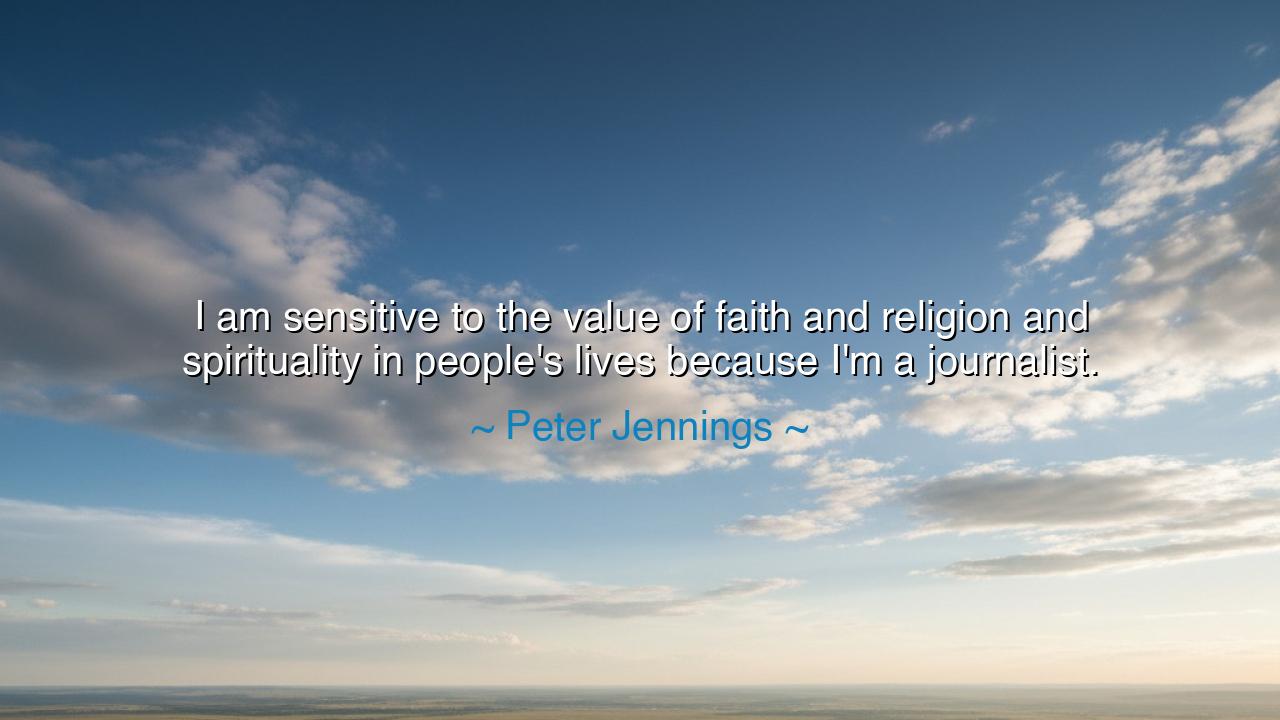
I am sensitive to the value of faith and religion and
I am sensitive to the value of faith and religion and spirituality in people's lives because I'm a journalist.






In the course of human history, faith has always been a guiding light, illuminating the path for individuals and communities. The words of Peter Jennings, "I am sensitive to the value of faith and religion and spirituality in people's lives because I'm a journalist," speak deeply to the understanding that faith is not only a personal or private matter but something that profoundly shapes the fabric of society. As a journalist, Jennings acknowledges the responsibility to respect the significance of spirituality in the lives of others, recognizing its role in shaping thoughts, actions, and the very meaning of existence. His words are a call to honor the deep connection between beliefs and identity, and a reminder that religion is not merely a set of rituals or dogma, but a living force that informs the lives of millions around the world.
The ancients understood the sacredness of faith and its vital role in the human experience. In ancient Greece, Homer portrayed the gods not as distant and indifferent beings, but as deeply involved in the lives of humans. In both the Iliad and Odyssey, the gods’ favor and wrath were central to the fates of men and women. Achilles’ great wrath and Odysseus’ journey home were shaped by the gods’ will, and through these stories, we see how religion and spirituality were woven into the very essence of life, influencing the choices and destinies of the characters. The gods in these epics were not mere deities—they were a reflection of the human condition, offering guidance, challenges, and sometimes even rebuke. Homer’s work serves as a powerful testament to the fact that faith is not merely an abstract concept but a force that shapes lives, identities, and societies.
Similarly, in ancient Egypt, the role of religion was foundational to the state and society. The pharaohs were not only political rulers but divine beings, seen as gods on earth with a sacred responsibility to uphold Ma’at, the principle of truth, balance, and order. Religion and politics were intertwined, and the faith of the people in their gods and their king ensured the stability of the kingdom. The pyramids, grand and eternal, stand as a testament to the profound belief that life, death, and the afterlife were governed by divine principles, and the reverence for the gods was a cornerstone of Egyptian identity.
In the more recent context of Western civilization, Christianity has been a defining force in shaping culture, ethics, and law. The teachings of Jesus Christ, as recorded in the Gospels, centered on love, compassion, and forgiveness, and these values permeated the lives of individuals and the policies of kingdoms for centuries. The Crusades, for all their tragic violence, were motivated by the fervent belief in the sacred duty of spreading Christianity, and Martin Luther’s Reformation called for a return to a personal, heartfelt faith rather than an institutionalized, dogmatic practice. The American Founding Fathers, while diverse in their personal beliefs, were influenced by religious ideals, and the principles of freedom and justice were often framed in terms of a higher moral order.
Peter Jennings, in his role as a journalist, sought to acknowledge the importance of faith in the lives of others, seeing it as a driving force in the narratives of individuals and communities. His sensitivity to the value of religion and spirituality speaks to the need for journalists, storytellers, and historians to approach matters of faith with respect and understanding. In a world often divided by ideologies, religion remains a central theme, and to engage with it without prejudice or dismissal is to engage with the human condition itself. Journalism, like other forms of storytelling, shapes how we understand the world, and the stories of faith are deeply embedded in the fabric of human history.
In our modern world, the interplay of faith and identity is ever more complex, as people across the globe grapple with religious diversity and the challenges of living in a pluralistic society. Religious conflict, such as the sectarian violence in the Middle East or the tensions between Islam and Christianity, shows that the human desire for faith can both unite and divide. But it is also through faith that many find meaning and purpose in life. The Dalai Lama’s message of compassion, for example, transcends religious boundaries, advocating for a universal respect for the dignity of every human being, regardless of faith. Faith, then, is not simply a matter of religious dogma but of human connection, and understanding and respect for the spiritual beliefs of others are essential in our interconnected world.
The lesson of Peter Jennings' reflection is clear: in our interactions with others, whether in journalism, politics, or our personal lives, we must approach faith with sensitivity and respect. Faith is not a monolithic experience; it is as diverse as humanity itself, with each individual finding meaning, comfort, and guidance in their own way. As we move forward in a world that is increasingly interconnected, let us remember that religion and spirituality are not just topics to be debated or examined but lived realities that shape the very essence of who we are. Whether we share the same faith or walk a different path, let us approach one another with the respect and understanding that all human beings are shaped by the values they hold most dear. Faith, when approached with wisdom and empathy, has the power to unite us, to elevate our common humanity, and to bring us closer to the truth of our existence.






AAdministratorAdministrator
Welcome, honored guests. Please leave a comment, we will respond soon